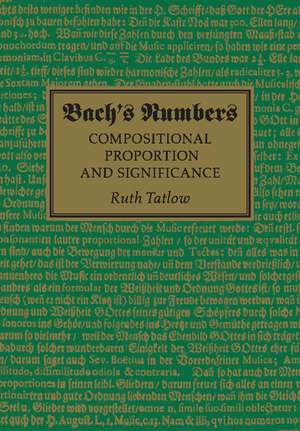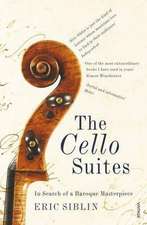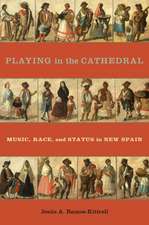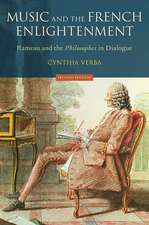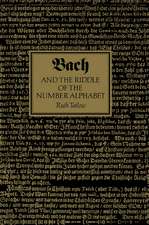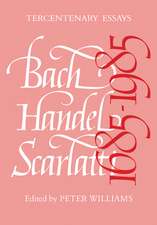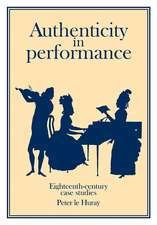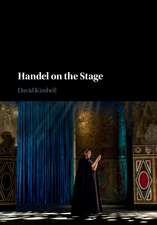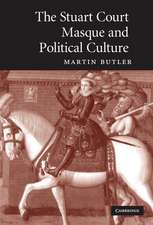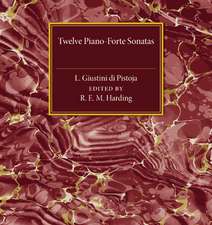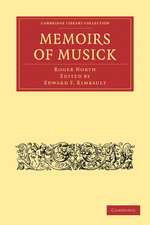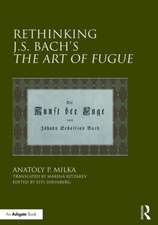Bach's Numbers: Compositional Proportion and Significance
Autor Ruth Tatlowen Limba Engleză Paperback – 5 oct 2016
| Toate formatele și edițiile | Preț | Express |
|---|---|---|
| Paperback (1) | 279.67 lei 6-8 săpt. | |
| Cambridge University Press – 5 oct 2016 | 279.67 lei 6-8 săpt. | |
| Hardback (1) | 822.21 lei 6-8 săpt. | |
| Cambridge University Press – 5 aug 2015 | 822.21 lei 6-8 săpt. |
Preț: 279.67 lei
Nou
Puncte Express: 420
Preț estimativ în valută:
53.52€ • 56.02$ • 44.54£
53.52€ • 56.02$ • 44.54£
Carte tipărită la comandă
Livrare economică 01-15 aprilie
Preluare comenzi: 021 569.72.76
Specificații
ISBN-13: 9781107459694
ISBN-10: 1107459699
Pagini: 430
Ilustrații: 9 b/w illus. 119 tables
Dimensiuni: 169 x 244 x 23 mm
Greutate: 0.68 kg
Editura: Cambridge University Press
Colecția Cambridge University Press
Locul publicării:New York, United States
ISBN-10: 1107459699
Pagini: 430
Ilustrații: 9 b/w illus. 119 tables
Dimensiuni: 169 x 244 x 23 mm
Greutate: 0.68 kg
Editura: Cambridge University Press
Colecția Cambridge University Press
Locul publicării:New York, United States
Cuprins
Part I. Foundations: 1. Bach's numbers; 2. Symmetry, proportion and parallels; 3. Unity, proportions and universal harmony in Bach's world; 4. Bars, compositional planning and proportional parallelism; Part II. Demonstrations: 5. Three collections for strings; 6. Four in two collections for keyboard; 7. Two further collections for keyboard; 8. Two small late collections; 9. Two large late collections; 10. Collections of concertos; 11. Collections of organ works; 12. Great passions and cantatas; 13. Festive cut-and-paste projects: masses and oratorios; 14. Lost blueprints; Appendix 1. Chronological index of musical doctrine.
Recenzii
'[This book] takes in all Bach's major collections and more, including the two Passions, three Oratorios and the B minor Mass. In sheer extent and richness of background, and number of works examined, Tatlow's book is a most original and impressive achievement that will need to be taken into account in future discussions of these fascinating compositions.' David Ledbetter, Early Music
'For anyone who wishes to explore the logical pathways of Bach's genius, Tatlow's analysis gets to the heart of the aesthetic, theological and Pythagorean presuppositions underlying the Bachian concepts of 'Vollkommenheit', perfection through calculation; and 'Harmonie' … the harmony of proportion, here a mirror of divine order.' Gian Mario Benzing, translated from Corriere della Sera (La Lettura)
'… Tatlow's approach to the subject matter is unique, and the vigorousness with which her methodology is applied has uncovered numerous new and unexpected facts. Bach scholarship cannot ignore her voice.' Yo Tomita, Music and Letters
… Bach's Numbers clears the way for some promising new directions in Bach scholarship. Tatlow's work should be valued not only for what it suggests for future study, however, but for what it provides in its own right: a bold historical rendering of Bach's compositional process that forces us to view some of the composer's greatest works in a new light, and with deepened appreciation.' Robert L. Wells, Music Analysis
'For anyone who wishes to explore the logical pathways of Bach's genius, Tatlow's analysis gets to the heart of the aesthetic, theological and Pythagorean presuppositions underlying the Bachian concepts of 'Vollkommenheit', perfection through calculation; and 'Harmonie' … the harmony of proportion, here a mirror of divine order.' Gian Mario Benzing, translated from Corriere della Sera (La Lettura)
'… Tatlow's approach to the subject matter is unique, and the vigorousness with which her methodology is applied has uncovered numerous new and unexpected facts. Bach scholarship cannot ignore her voice.' Yo Tomita, Music and Letters
… Bach's Numbers clears the way for some promising new directions in Bach scholarship. Tatlow's work should be valued not only for what it suggests for future study, however, but for what it provides in its own right: a bold historical rendering of Bach's compositional process that forces us to view some of the composer's greatest works in a new light, and with deepened appreciation.' Robert L. Wells, Music Analysis
Descriere
Ruth Tatlow employs theoretical evidence and practical demonstrations to explain how and why Bach used numbers in his published compositions.
Notă biografică
British-Swedish musicologist Ruth Tatlow is a widely published independent scholar and editor with a research base in Stockholm, Sweden, and a performance background as a prize-winning clarinettist (as Ruth Ballard). Her examination of compositional theory and practice in the works of J. S. Bach began with her doctoral thesis Lusus musicus vel poëticus (King's College, London University, 1987) and produced ground-breaking results reflected in her publications that include two classic monographs, Bach and the Riddle of the Number Alphabet (Cambridge, 1991) and Bach's Numbers: Compositional Proportion and Significance (Cambridge, 2015), the latter awarded Choice 'Outstanding Academic Title 2016'. Her current research interests include tracing the origins and transmission of proportional parallelism 1650-1850, and the theory and practice of emblematic techniques in early eighteenth century music collections. She co-founded Bach Network in 2004 and its journal Understanding Bach in 2006. She currently serves as chair of the Bach Network Council and is a member of the Editorial Board of the American Bach Society. https://orcid.org/0000-0003-3367-9921
